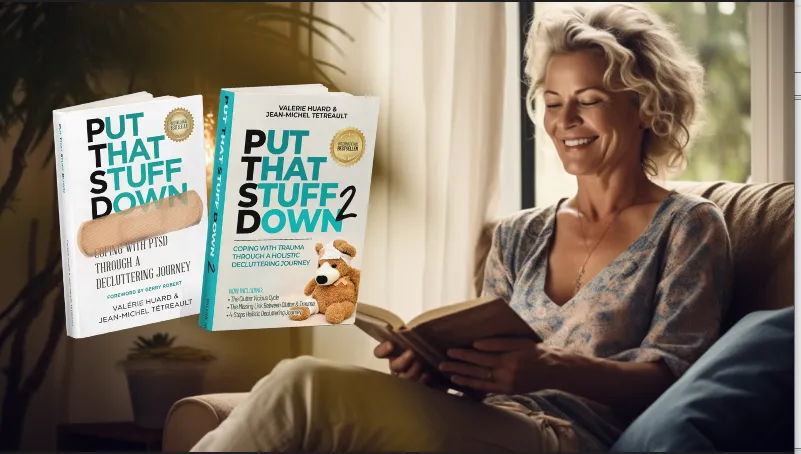
The Bestsellers: Put That Stuff Down Books - Explore the 4-Step Holistic Decluttering Method | Authors Valerie Huard & JM Tetreault
Welcome to a journey of self-discovery and transformation through the pages of two remarkable bestsellers: "Put That Stuff Down Book" and its captivating sequel, "Put That Stuff Down 2 Book." Authored by the insightful minds of Valerie Huard and JM Tetreault, these books have touched the lives of countless readers with their powerful messages and practical wisdom.
In this blog, we embark on an exploration of the profound content and invaluable insights presented in these two literary gems. Valerie Huard and JM Tetreault, the authors behind these bestsellers, have harnessed their expertise to guide readers on a transformative journey. As we delve into the essence of these books, we aim to provide you with a glimpse of the treasures they hold.
Our mission is clear: to offer you a genuine understanding of the books' content, the depth of knowledge they contain, and the real-life success stories that have emerged from applying their principles. This is not a sales pitch; it's an authentic exploration designed to help you determine if these books are the right companions for your journey of personal growth, decluttering, and healing.
So, join us as we unlock the profound teachings within "Put That Stuff Down, Coping with PTSD Through a Decluttering Journey" and "Put That Stuff Down 2, Coping With Trauma Through a Holistic Decluttering Journey", and discover the transformative power they hold within their pages.
Trauma and Clutter Connection
In the realm of decluttering and healing, there's a surprising link between trauma and clutter. This connection delves into how these seemingly unrelated concepts impact both our minds and bodies, reshaping our paradigms—the way we perceive the world.
Paradigms are our invisible guides, influencing our thoughts, emotions, and reactions to life. Trauma and clutter may appear unrelated, but they share a common thread: they can change our bodies, rewire neural pathways, and influence our mindsets, habits, routines, and behaviors.
Trauma activates the stress response, releasing cortisol and altering neural pathways. This affects our mindset and paradigms. Similarly, clutter can cause stress, elevating cortisol levels and impairing executive functions, influencing our paradigms.
This connection hinges on the interplay between stress, cortisol, and executive functions, which are crucial for understanding how trauma and clutter shape our paradigms. Both experiences can disrupt executive functions, altering our mindset, habits, routines, and behaviors.
Though the link between trauma and house clutter may seem unlikely, it underscores how environmental stress affects neurological well-being. Trauma can compromise brain function, especially in areas like the prefrontal cortex and the amygdala. Clutter exacerbates this by triggering anxiety and disorganization.
This intricate relationship offers valuable insights for researchers and mental health professionals. Understanding how environmental stress impacts brain function can lead to strategies for creating more organized, peaceful environments, ultimately promoting better neurological health and overall well-being.
We discovered that having a professional organizer guide the client through a holistic decluttering approach can relieve frustration. This is one of the secrets we share in our 'trauma secrets' podcast, where individuals can learn to regain joy and joie de vivre.
The Missing Link: Trauma and Decluttering
As discussed earlier, both trauma and clutter have the power to reshape our bodies, rewire our minds, heal us and impact our behaviors. The books underscore the significance of recognizing this connection as the "missing link" in the path to healing and decluttering.
By understanding how trauma can manifest in clutter and how our living spaces mirror our emotional state, readers gain valuable insights. These insights go beyond physical clutter and delve into the emotional clutter that often accompanies trauma.
The books serve as guides, offering practical advice and psychological wisdom. They empower individuals to confront their emotional clutter, highlighting that decluttering isn't solely about organizing possessions—it's also about untangling emotional knots.
Ultimately, the books reveal that by addressing emotional clutter, individuals can create clutter-free environments that support healing and growth. This awareness forms the foundation for transformative change, inviting readers on a journey of self-discovery and renewal.
What Happens When We Don't Clear Emotional Clutter
Neglecting emotional clutter can lead to various consequences:
Heightened Stress and Anxiety: Unresolved emotions create chronic tension and anxiety, affecting daily life.
Overwhelm and Inaction: Emotional clutter can overwhelm us, making it difficult to make decisions or take action.
Strained Relationships: Unaddressed emotions can strain relationships, leading to conflicts and misunderstandings.
Negative Self-Talk: Emotional clutter fuels self-doubt and self-criticism, limiting self-worth.
Physical Health Effects: Emotional clutter can manifest as physical health issues, weakening the immune system.
Stagnation: It keeps us stuck in the past, hindering personal growth.
Lack of Clarity: Emotional clutter impairs mental clarity and focus, making it hard to set goals.
Money: people will tend to spend or lose more money as a result of.
Clearing emotional clutter is essential for emotional well-being, fostering healthier relationships, creating a clear space for personal growth, and saving money through decluttering.
Valerie Huard & JM Tetreault: The Authors
Valerie Huard and Jean-Michel Tetreault, the authors of "Put That Stuff Down" and "Put That Stuff Down 2," are not only a dynamic duo in the world of decluttering and healing but also the founders of DO Well—an organization dedicated to helping individuals find emotional well-being through decluttering and organizing.
Valerie Huard is a bestselling author, speaker, and decluttering expert with a background in occupational therapy. Her dedication to improving lives earned her recognition and an award. Valerie's journey through trauma and C-PTSD led her to discover the connection between clutter and emotional well-being. She created the "Put That Stuff Down" method, helping trauma survivors reclaim their lives.
JM (Jean-Michel) Tetreault is a bestselling author and a retired senior military officer. His experiences with trauma and family moves due to military service inspired his commitment to supporting others. He played a crucial role in Valerie's healing journey from C-PTSD. JM and Valerie founded DO Well®, refining their decluttering method to help individuals with emotional and traumatic disorders.
Together, Valerie and JM are the driving force behind DO Well, where they passionately share their knowledge and expertise to empower others to overcome emotional clutter. Their commitment extends beyond decluttering into various facets of life, helping individuals, friends and families lead happier, healthier, and more organized lives.
Through the writing of their books and DO Well, they've touched the lives of thousands, offering hope, healing, and practical guidance on the path to decluttering and well-being.
The Duo Podcast: Post-Trauma Secrets & Decluttering
In their podcast, "Post Trauma Secrets & Decluttering," Valerie Huard and JM Tetreault brilliantly expand on the methodologies found in their books, "Put That Stuff Down" and "Put That Stuff Down 2." This collaborative effort is a treasure trove of insights, offering engaging stories, deep explanations, and practical applications of their holistic decluttering approach. It's a dynamic platform that vividly demonstrates how its principles support emotional healing, personal development, and decluttering, making it an invaluable resource for those seeking a clutter-free, balanced life. Available on Apple Podcast.
You can also visit the sibling YouTube Channel: Post-Trauma Secrets & Decluttering: https://youtube.com/@dowellht a. This channel is dedicated to making decluttering & post-trauma healing easy and accessible, with plenty of videos and tutorials on how to get started. Whether you’re just beginning your journey or are already well into the process, this is an invaluable resource that provides comprehensive support and guidance throughout every step of the process.
Book 1: "Put That Stuff Down" in Brief
"Put That Stuff Down" is the first book in the bestselling series authored by Valerie Huard and Jean-Michel Tetreault. In this transformative work, the authors delve deep into the intricate relationship between trauma, PTSD, and decluttering, offering invaluable insights and practical advice. Key Themes and Insights:
Trauma and Clutter Connection: The book uncovers the profound connection between trauma and clutter. Drawing from personal experiences, Valerie and JM emphasize how unaddressed trauma can manifest as physical and emotional clutter in our lives.
Challenging Common Myths: The authors challenge common misconceptions surrounding PTSD, emphasizing that it is treatable with the right combination of medication, therapy, and support. They offer hope to those struggling with trauma-related issues.
The Power of Readiness and Commitment: "Put That Stuff Down" stresses the importance of being ready and committed to the decluttering journey. It advocates setting SMART goals and cultivating a resilient mindset that allows for adaptation and alignment with one's values.
The Role of Affirmations and Positive Thinking: The book explores the transformative power of affirmations and positive thinking in overcoming fear and healing trauma. It highlights the interplay between the conscious and subconscious minds in this process.
Clutter's Impact on Cognitive Functioning: Valerie and JM emphasize the significance of an organized, clutter-free environment in fostering harmony and efficiency. They reveal three secrets to successful decluttering, including the KonMari method.
Stress Relief and Mindfulness: Practical advice on organizing and decluttering is complemented by an exploration of stress-relief techniques and mindfulness practices. The authors stress the importance of addressing emotional clutter alongside physical clutter.
Time Management for PTSD: Time management emerges as an essential theme, with a focus on overcoming the constraints of PTSD. By meticulously planning, prioritizing, and allocating time, individuals can take charge of their lives and harness time as an ally in achieving personal growth.
Self-Compassion and Change: The book concludes with a reflection on the importance of self-compassion and embracing change after PTSD recovery. It underscores the value of self-improvement, gratitude, and community engagement.
"Put That Stuff Down" offers a profound perspective on healing, decluttering, and personal growth. It equips readers with the tools and mindset needed to navigate the challenging terrain of trauma, guiding them toward a clutter-free, harmonious life.
Personal Stories of Transformation
The power of "Put That Stuff Down" and "Put That Stuff Down 2" extends far beyond the pages of these books, as real-life success stories from individuals who have applied their knowledge demonstrate.
Here are some heartfelt testimonials that showcase the transformative impact of these books:
Barry Spilchuk, Founder of www.TheLEGACY.club and co-author of A Cup of Chicken Soup for the Soul, recognizes the simplicity and effectiveness of the decluttering techniques within the books. He emphasizes how these techniques empower individuals dealing with PTSD to take control of their own healing journey.
Nikki Arnold, Author of POSITIVITHINK™, applauds the books for sharing simple yet powerful techniques that enhance the lives of those suffering from PTSD. These methods, she notes, help individuals find inner calm by re-evaluating their lives, reorganizing their patterns, and reducing negative beliefs, ultimately leading to peace and harmony.
Winnie Chin, Author of "This Ability, NOT Disability," hails Valerie Huard and JM Tetreault as rockstars dedicated to helping people with PTSD understand how trauma is intertwined with the accumulation of physical and emotional clutter. Their guidance provides valuable tips and tricks for creating an organized and welcoming home while coping with PTSD.
Susie Nelsen, Author of "Finishing Well," acknowledges the debilitating nature of PTSD and how the books offer a path to overcoming stress and anxiety. Starting with the organization of one's home, she highlights how a clean environment can lead to a clear mind and a strengthened mindset.
Jane M.C., a pharmacist, finds the books incredibly useful, not just for decluttering but also for the wealth of information they contain. The guidance within the books offers valuable insights for personal growth and well-being.
DW Richardson, MD. FRCP{C}, describes "Put That Stuff Down" as a significant contribution to modern PTSD theory and treatment. The positive approach to cognitive behavior therapy and practical coaching suggestions within the book provides readers with motivation and guidance on their psychological journey.
Maura S. expresses a sense of hope that she discovered in the books, emphasizing the positive impact they've had on her from as early as page 20.
Melisa J. praises the supportive and non-judgmental community created by the authors. Attending a Zoom Q & A session left her feeling loved and empowered, providing the necessary support to tackle clutter and embark on a transformative journey.
Sara T. celebrates the discovery of a resource that not only helps with decluttering but also recognizes the link between clutter and trauma. She looks forward to a cleaner and healthier environment in 2021.
Parul S. MSP, RSW, loved the book for its straightforward guidance on decluttering physical space through mindful thinking and processing. She acknowledges the book's potential to guide individuals coping with PTSD or trauma through their decluttering journey.
Myriam B. recognizes Valerie's compassion and expertise, highlighting her ability to connect with clients and guide them through the process of change.
These testimonials shed light on the profound impact of "Put That Stuff Down" and "Put That Stuff Down 2" in helping individuals cope with PTSD, declutter their lives, and find healing and transformation.
These books have provided hope, guidance, and practical tools to countless readers, making a positive difference in their lives.
Mindfulness and Emotional
In the journey of decluttering and healing, mindfulness emerges as a powerful ally, as emphasized in the books authored by Valerie Huard and JM Tetreault. Mindfulness plays a pivotal role in fostering emotional resilience and achieving clutter-free spaces.
Mindfulness involves being fully present in the moment and observing thoughts and feelings without judgment. It allows individuals to gain clarity on their emotional state and thought patterns. In the context of decluttering, mindfulness serves several vital purposes:
Awareness of Emotional Clutter: Mindfulness helps individuals recognize emotional clutter, the root causes of their attachment to possessions, and the emotions tied to them. By acknowledging these emotions without judgment, individuals can begin the process of letting go.
Stress Reduction: The decluttering journey can be emotionally taxing. Mindfulness practices, such as deep breathing and meditation, help reduce stress and anxiety, making it easier to navigate the process.
Enhanced Decision-Making: Mindfulness sharpens decision-making skills. By staying present and focused, individuals can make clear and intentional choices about what to keep and what to discard.
Emotional Resilience: Building emotional resilience is crucial in overcoming the challenges of decluttering, especially when dealing with traumatic memories. Mindfulness equips individuals with the tools to face emotional triggers with calmness and self-compassion.
Gratitude and Contentment: Mindfulness encourages gratitude for the present moment and contentment with what one already has. This mindset shift can reduce the compulsion to accumulate more possessions.
Incorporating mindfulness into the decluttering process can lead to profound emotional healing and the creation of clutter-free, harmonious environments. Valerie and JM's books provide guidance and techniques to help readers integrate mindfulness practices into their decluttering journey, ultimately promoting emotional well-being and personal growth.
Time Management and Organization
Time management and organization are essential elements in decluttering and personal growth. In the books authored by Valerie Huard and JM Tetreault, these aspects play a pivotal role.
Importance of Time Management: Effective time management allows individuals to dedicate time to decluttering, ensuring steady progress and preventing overwhelm. It provides a sense of control and prioritizes decluttering as a meaningful part of life.
The Role of Organization: The organization complements decluttering by offering structure and efficiency. It simplifies the process, reduces decision fatigue, and maintains order. The organization supports personal growth by instilling discipline, enhancing productivity, and enabling the pursuit of higher goals.
Valerie and JM's books offer practical guidance in time management and organization, empowering readers to navigate decluttering with clarity and purpose while fostering personal growth.
Minimalism and Eco-Friendly Practices
The books authored by Valerie Huard and JM Tetreault not only guide readers through the process of decluttering but also advocate for two essential principles: minimalism and eco-friendly practices.
Embracing Minimalism: Minimalism is a mindset that encourages individuals to prioritize what truly matters in their lives while letting go of excess possessions and clutter. Valerie and JM emphasize that by adopting a minimalist approach, readers can simplify their lives, reduce the accumulation of unnecessary items, and find contentment in the essentials.
Eco-Friendly Living: The authors are passionate advocates for eco-friendly practices. They stress the importance of responsible consumption and disposing of unwanted items in an environmentally conscious manner. By reducing waste, reusing, and recycling, readers can contribute to a more sustainable future and a healthier planet.
Valerie and JM's books inspire readers to embrace minimalism and integrate eco-friendly practices into their decluttering journey. By doing so, individuals not only create clutter-free, organized spaces but also contribute to a more balanced and environmentally conscious way of living.
Book II: "Put That Stuff Down 2" Overview
"Put That Stuff Down 2" is the captivating sequel to the first book, offering an expanded exploration of decluttering, healing, and personal growth. In this more than 400-page bestseller, Valerie Huard and JM Tetreault delve even deeper into the world of holistic decluttering, revealing fresh insights into the connection between trauma, clutter, and personal development.
This sequel expands on the groundwork laid in the first book, offering readers a deeper understanding of mindfulness, emotional resilience, and sustainable living. It is divided into five sections and 20 chapters, providing a comprehensive exploration of these topics.
It's not just a continuation but an evolution of the ideas and concepts introduced in the original work. "Put That Stuff Down 2" promises to take you on another transformative journey, uncovering profound insights and practical wisdom to enhance your life. Now, let's explore the content of this phenomenal bestseller.
Part I - Introduction and Foundations: In this initial section, we'll lay the groundwork by defining the core concepts of trauma, clutter, and holistic decluttering. We'll explore the profound connection between trauma and clutter, offering insights that provide a solid foundation for the journey ahead. If you're already familiar with the first book, you'll find a helpful recap of essential insights, ensuring you're prepared for the deeper exploration of new material. Additionally, we'll highlight the numerous benefits that come with adopting a holistic approach to decluttering.
Part II - Declutter Stress - Understanding and Coping with Trauma: Our journey continues with a deep dive into the neuroscience of trauma and clutter. Through real-life stories, we'll illustrate how trauma manifests in our cluttered environments and explore strategies to release stress and anxiety through decluttering and emotional healing. We'll also guide you on the path to building emotional stability and resilience as you confront the clutter that's intertwined with your traumatic experiences.
Part III - Declutter Mind - Mindfulness and Personal Growth: In this section, we'll emphasize the role of mindfulness in emotional healing during the decluttering process. You'll discover how decluttering can be a transformative journey toward personal growth, fostering a growth mindset and a commitment to lifelong learning. We'll also explore the importance of creating a meaningful connection with your living space by aligning it with your core values.
Part IV - Declutter Time - Effective Time Management and Organization: Efficiency becomes the focus as we delve into the art of prioritizing and sorting to make your decluttering process both efficient and effective. You'll learn how to develop personalized organizational systems to keep clutter at bay and the significance of setting boundaries and nurturing healthy relationships for a clutter-free life. We'll also guide you in evaluating and making informed choices about your lifestyle to support your decluttering journey.
Part V - Declutter Space - Practical Strategies and Continuing Your Journey: Finally, we'll get hands-on with clutter-busting techniques to free yourself from unwanted possessions. We'll explore how to sustain clutter-free living and adapt your spaces to your evolving needs. Along the way, we'll give practical tips to help you identify and overcome common obstacles that may hinder your decluttering progress. As we conclude our journey, you'll reflect on the transformative potential of a decluttered life and discover how to inspire others to embark on their decluttering journey.
Our journey begins here, where we lay the foundation for holistic decluttering by understanding its core principles. So, let's dive into the pages of "Put That Stuff Down 2" and explore the transformative power of decluttering, personal growth, and the art and joy of living clutter-free.
Books Are Not For Everyone
While "Put That Stuff Down" and its sequel, "Put That Stuff Down 2," offer valuable insights and transformative approaches to decluttering and healing from trauma, it's essential to acknowledge that these books may not be a perfect fit for everyone. Here, we explore who these books may not be for:
Quick Fixes Seekers: If you're looking for a magic solution that promises instant results without any effort, these books may not align with your expectations. Holistic decluttering and healing take time, effort, and commitment.
Skeptics of the Mind-Body Connection: These books emphasize the profound connection between emotional clutter and physical clutter, advocating for a holistic approach to decluttering. If you're skeptical about the mind-body connection, you may not resonate with the principles presented.
Individuals Unwilling to Confront Trauma: Addressing trauma is a central theme in these books, and they encourage readers to confront their past experiences and emotions. If you're not ready or willing to explore your trauma, these books may not be the best choice at this moment.
People Not Open to Personal Growth: The books emphasize personal growth, a growth mindset, and the willingness to embrace change. If you're resistant to personal development and growth, the content may not align with your current goals.
Readers Looking for Detailed Practical Guides: While these books offer practical advice, they do not provide a step-by-step manual for decluttering. Instead, they focus on the holistic journey and understanding the emotional connection to clutter. If you're seeking a detailed, prescriptive guide, you might not find it here.
Those Not Willing to Challenge Beliefs: These books encourage readers to challenge their beliefs, paradigms, and thought patterns. If you're not open to questioning and reshaping your beliefs, this approach may not be suitable for you.
Individuals Not Ready to Commit: Holistic decluttering and healing require commitment and consistency. If you're not prepared to invest time and effort in the process, these books may not align with your current circumstances.
People Who Prefer Traditional Self-Help: If you're more comfortable with traditional self-help approaches that focus solely on external organization without addressing emotional clutter, these books may not meet your preferences.
It's important to remember that reading these books is a choice, and they are most effective when readers are open, willing, and ready to embark on a holistic decluttering and healing journey. While they may not be for everyone, for those who resonate with their principles, they can be powerful tools for personal transformation and achieving a clutter-free life.
Embarking on Your Holistic Decluttering Journey
We encourage readers to take action and embark on their own transformative holistic decluttering journey. By letting go of physical and mental clutter, creating space for what truly matters, and embracing a minimalist mindset, one person can experience a profound sense of freedom, clarity, and peace in their life. Start today and discover the transformative power of decluttering!




